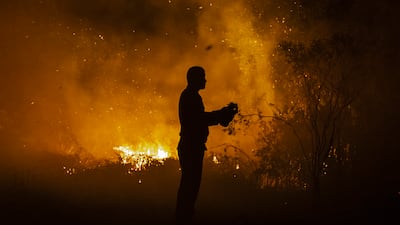There is little doubt that when it comes to climate change, there are fewer emotive issues than how to help and compensate poorer countries for the loss and damage they are suffering owing to global warming. Developing nations with a minimal carbon footprint for years have been bearing the brunt of increasing temperatures, extreme weather and rising sea levels – despite not being responsible for the decades of industrial activity that has been relentlessly changing our planet’s climate.
A sense of unfairness underpins the complex international talks about creating a financial mechanism to not only compensate such countries, but to help them cope with the irreversibly changed climate that is already wreaking havoc in many parts of the world, which can ill-afford to deal with worsening floods, droughts and wildfires.
The principle of a loss and damage fund was established at Cop27 in Egypt last year in what was considered to be a breakthrough moment, with developing countries in what’s often referred to as the Global South having strongly argued for such a mechanism for decades. But governments have since struggled to reach consensus on how such a fund would operate and be administered. Therefore, with a little over three weeks to go until the beginning of the Cop28 climate summit in Dubai, a deal on a loss and damage fund reached by a special UN committee in Abu Dhabi on Saturday is a step in the right direction.
Among several recommendations endorsed by the TC5 transitional committee is one that would see the World Bank act as the fund’s interim host. There are still reservations about the organisation holding this vital role, with some developing countries regarding the proposal as potentially representing the interests of western countries. However, the current president of the organisation – India-born executive Ajay Banga – has made clear his commitment to involve the Global South in climate funding and has suggested other novel ideas.
Earlier this month he told the IMF and World Bank Annual Meetings plenary session in Marrakesh that he was open to finding a way to use IMF Special Drawing Rights as capital to increase lending to fight global warming. He also laid out his vision of expanding the scope of lending to include climate finance as well as cheaper and longer maturity funding. In addition, the bank has freed up $40 billion from its balance sheet to boost funding for projects across the developing world.
No one is suggesting that are any easy answers when it comes to developing an effective and just mechanism for climate finance. But the deal reached on Saturday – which will be considered by 198 parties at Cop28 later this month – continues the momentum generated by a successful two-day “pre-Cop” meeting of more than 70 ministers in Abu Dhabi that agreed on an agenda for the summit in advance, freeing up precious time for delegates to tackle burning issues.
This momentum, if built upon, could lead to a Cop summit that has a positive effect beyond the environment. On Friday, the UN Conference on Trade and Development said that finally establishing a loss and damage fund that is fit for purpose could “reverberate beyond immediate beneficiaries, reinvigorating multilateralism in a moment of compounding global crises and demonstrating the collective priority of delivering the Paris Agreement and Sustainable Development Goals for a safe and secure future for all”. This echoes a recent point made by Dr Sultan Al Jaber, Cop28 President-designate and UAE Minister of Industry and Advanced Technology, who said there were “too many things dividing our world at this moment”, urging global unity for climate action.
There is a long way to go, and it is important to acknowledge progress, even if incremental. If compromise and consensus on such thorny topics can be reached – even at the 11th hour – that could set the stage for a positive, solutions-focused summit.


